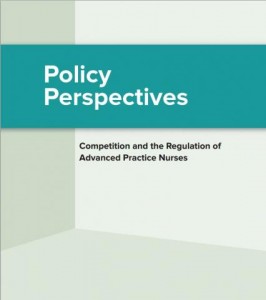Mar 11, 2014
FTC: Expanded APRN Scope of Practice Good for Competition and Consumers
 On March 7, 2014, the Federal Trade Commission (FTC) released a staff paper urging state legislators and policy makers to be mindful when evaluating proposals that limit access to care provided by advanced practice registered nurses (APRNs). In the paper, Policy Perspectives: Competition and the Regulation of Advanced Practice Nurses, the FTC concludes that “expanded APRN scope of practice is good for competition and American consumers.”
On March 7, 2014, the Federal Trade Commission (FTC) released a staff paper urging state legislators and policy makers to be mindful when evaluating proposals that limit access to care provided by advanced practice registered nurses (APRNs). In the paper, Policy Perspectives: Competition and the Regulation of Advanced Practice Nurses, the FTC concludes that “expanded APRN scope of practice is good for competition and American consumers.”
The paper combines the analyses and comments the FTC has issued over the past three years on the likely competitive effects of proposed changes to APRN regulations in Massachusetts, Connecticut, West Virginia, Louisiana, Kentucky, Texas, and Florida.
The Institute of Medicine’s evidence-based report, The Future of Nursing: Leading Change, Advancing Health, specifically called on the FTC to “review existing and proposed state regulations concerning advanced practice registered nurses to identify those that have anticompetitive effects without contributing to the health and safety of the public.”
Key findings:
- “Based on our extensive knowledge of health care markets, economic principles, and competition theory, we reach the… conclusion expanded APRN scope of practice is good for competition and American consumers.” (p. 38)
- “Mandatory physician supervision and collaborative practice agreement requirements are likely to impede competition among health care providers and restrict APRNs’ ability to practice independently, leading to decreased access to health care services, higher health care costs, reduced quality of care, and less innovation in health care delivery.” (p. 38)
- “Empirical research and on-the-ground experience demonstrate that APRNs provide safe and effective care within the scope of their training, certification, and licensure.” (p. 38)
- “Restrictive physician supervision requirements exacerbate well-documented provider shortages that could be mitigated via expanded APRN practice.” (p. 20)
- “Excessive supervision requirements may increase health care costs and prices.” (p. 27)
- “Fixed supervision requirements may constrain innovation in health care delivery models.” (p. 31)
- “Mandated collaboration agreements between APRNs and physicians are not needed to achieve the benefits of physician-APRN coordination of care.” (p. 34)
- Based on the FTC’s research, physician supervision and collaboration requirements “do not appear to be justified by legitimate health and safety concerns. Specifically, our research did not identify significant evidentiary support for either the claim that independent APRN practice gives rise to significant safety concerns, or the claim that mandatory supervision requirements redress such concerns.” (p. 36)
- “A large body of empirical research strongly suggests that APRNs are safe and effective providers of diverse primary care services. Similarly, we have not seen research suggesting that the safety or quality of primary care services declines when APRN supervision or collaborative practice requirements are lessened or eliminated.” (p 37)
The paper also sets forth guidelines that state legislators should use when considering changes to APRN scope of practice. Among these guidelines are:
- “Consumer access to safe and effective health care is of critical importance.” (p. 3)
- “Competition among health care providers yields important consumer benefits, as it tends to reduce costs, improve quality, and promote innovation and access to care.” (p. 4)
- “APRN scope of practice limitations should be narrowly tailored to address well-founded health and safety concerns, and should not be more restrictive than patient protection requires. Otherwise, such limits can deny health care consumers the benefits of competition, without providing countervailing benefits.” (p. 4)
Read the paper here.
Read the press release here.
